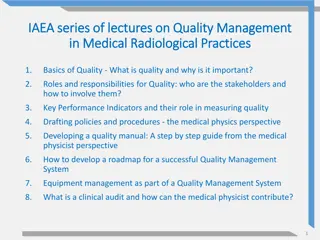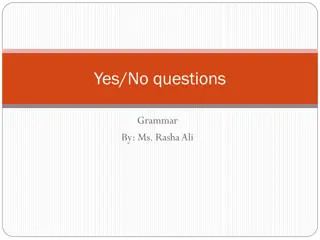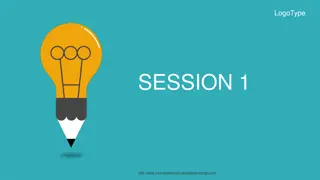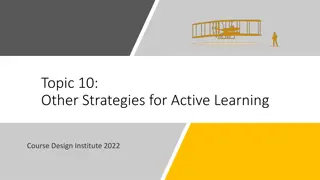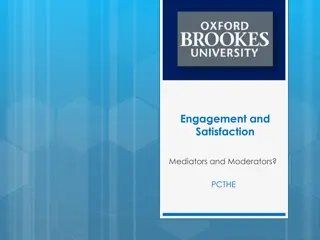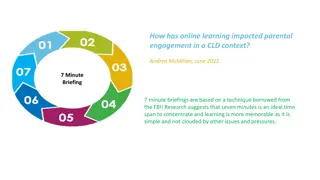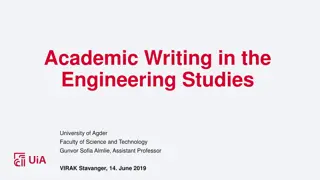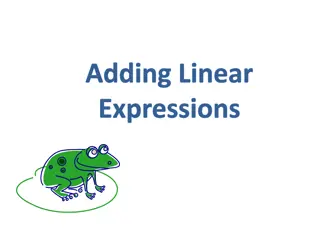Benefits of Adding Questions in Lectures: Enhancing Learning Through Engagement
Adding questions throughout lectures can improve student engagement, retention of information, and critical thinking skills. This study explores the impact of incorporating retrieval practice into classroom settings and examines hypotheses related to testing effects for various course topics.
Download Presentation

Please find below an Image/Link to download the presentation.
The content on the website is provided AS IS for your information and personal use only. It may not be sold, licensed, or shared on other websites without obtaining consent from the author.If you encounter any issues during the download, it is possible that the publisher has removed the file from their server.
You are allowed to download the files provided on this website for personal or commercial use, subject to the condition that they are used lawfully. All files are the property of their respective owners.
The content on the website is provided AS IS for your information and personal use only. It may not be sold, licensed, or shared on other websites without obtaining consent from the author.
E N D
Presentation Transcript
BENEFITS OF ADDING QUESTIONS THROUGHOUT LECTURES Elizabeth Shobe Professor of Psychology
INTRODUCTION The basic testing effect methodology involves presentation of information, followed by an initial test (retrieval practice), restudy or an unrelated task, and then followed by a delayed test. A testing effect occurs when delayed test performance is higher following retrieval practice than other conditions. Goal 1: Review the testing effect literature to determine elements that can be adapted in an authentic classroom. Accuracy and feedback Relationship between retrieval practice and delayed test Goal 2: Modify experimental methodology for adaptation in ecologically valid class setting Instructor workload Class time Resources Equity Goal 3: Determine if a simple method incorporating retrieval practice into existing introductory psychology course was sufficient for testing effects Feasibility Sustainability
HYPOTHESES Hypothesis 1 Students with retrieval practice distributed throughout a lecture will demonstrate higher performance on a delayed test than those in previous classes who did not have retrieval practice. This conceptually replicates the findings of Healy et al. (2017), Weinstein et al. (2016), and Shapiro and Gordon (2012) by incorporating retrieval practice after short blocks of information. Critically, the precise duration of the blocks was intentionally loosely controlled in this study to fit genuinely into the natural discourse and topic coverage of an authentic class. Hypothesis 2 Testing effect will be consistent across multiple sections of Introduction to Psychology but may not be observed for biopsychology, sensation and perception, or health topics. While testing effects have been observed with jargon-heavy courses (e.g., McDaniel et al., 2012), introductory psychology students are not immersed in that content for the semester, have varying degrees of interest and minimal background in cellular or functional neuroanatomy, and they struggle the most with these topics (Peck et al., 2006). Moreover, Woolridge et al. (2014) did not find a testing effect for closely related concepts in an evolutionary biology chapter and Jensen et al. (2014) only had success in a biology course for non-majors when retrieval practice questions directly facilitated elaboration. As such, without additional manipulations, testing effects for these topics may be elusive in introductory psychology. Hypotheses 3 No testing effect differences will be observed between retrieval practice questions that are identical to and closely related to questions on the delayed test. Adequate coverage of concepts has resulted in testing effects for identical and closely related questions (Batsell et al., 2017; Chan, 2009; Chan et al., 2006; Bjork et al., 2014; Jenson et al., 2013) and this should extend to an authentic classroom.
METHOD Participants 384 students enrolled across four class sections of Introductory Psychology participated for no compensation. Fall 2018 (F18) (n = 96), Spring 2019 (S19) (n = 96), Fall 2019 (F19a) (n = 97) and Fall 2019 (F19b) (n = 95). Mean age = 20, 75% female. Procedure Students attended class twice per week, 110 minutes per session. Each session included a lecture accompanied by a PP. F19 sections had PP with retrieval practice, F18 and S19 had PP without retrieval practice. Retrieval practice occurred after approximately 15 to 25 minutes of lecture. The instructor (author) read each question aloud and asked students to orally volunteer answers, followed by a quick hand poll of agreement among the students. Materials Delayed Test Six multiple choice unit quizzes defined the delayed tests. Each quiz covered the chapters in the unit. Responses were recorded on a scantron form and machine scored. The instructor orally provided confirmatory or corrective feedback for each question before presenting the next question or resuming lecture. Retrieval Practice Questions Short blocks of four to seven multiple choice questions were added to all PowerPoint presentations (PP) for F19a and F19b sections. Blocks were inserted after major concepts or short sections spanning approximately three to five lecture slides. Repeated questions were identical to those on the unit 1, 3, and 6 quizzes New questions were different from quizzes 2, 4, and 5; different or related aspect of a concept than the delayed test. Each block used two to four minutes, and total time used per class session was within the range of 8 - 15 minutes. All students had access to PP without retrieval practice questions through Blackboard from the start and throughout the duration of the semester. Retrieval practice questions were not accessible outside of class or on personal devices, other than what students wrote down at time of presentation. No electronic devices were allowed during class sessions as a course policy.
Hypothesis 3. RESULTS Hypothesis 2. Point Advantage for Retrieval Practice Across Six Quizzes Comparisons of Repeated and New Retrieval Practice Questions to No Retrieval Practice Hypothesis 1. Higher Quiz Average with Retrieval Practice than Without Note. Figure shows no significant difference between retrieval practice conditions (repeated, new), bit equally and significantly better than quiz performance without any retrieval practice. Note. Figure shows the average difference for each quiz (abbreviated as Q), and a significant advantage for classes with retrieval practice over those without for all but Q2 (Health) and Q6 (sensation, Perception, biopsychology). * No difference between repeated (M = 67.10, SE = 0.84) and new (M = 67.37, SE = 0.93), t(190) = -0.48, p = .63, 95% CI [.84, 1.38], Cohen s d = .03. p < .01 *t(382) = 3.94, p< .001, 95% CI [2.27, 6.81], Cohen s d = 0.40. Levene s test, F(1, 382) = 0.92, p =.34 * p < .05
RESULTS Grade (min. score) Retrieval Practice Retrieval practice conditions means (M), standard errors (SE) for six quizzes With Without 100 100 A ( 90) Quiz Retrieval Practice 97.9 99 A- (89) Retrieval practice comparison of percentile rank for each grade range With Without 93.7 97.9 B+ (86) M SE 75.60 0.97 M SE 63.80 0.96 1 86.9 91.7 B (80) 84.3 91.2 67.48 1.18 65.98 1.06 B- (79) 2 77 88.1 C+ (76) 67.89 1.33 57.69 1.28 3 57.1 76.2 C (70) 71.89 1.09 68.09 0.91 4 56 73.6 C- (69) 67.52 1.07 61.91 1.01 5 44.5 63.7 D+ (66) 57.96 1.21 55.98 1.08 6 27.7 40.9 D (60) 23 36.8 D- (59)
CONCLUSION Retrieval practice after short blocks of lecture improves delayed test performance No difference was observed between repeated and new questions Jargon-heavy or complex topics may require retrieval practice that facilitate elaboration This method can be feasibly implemented using little class time, no additional resources, and minimal additional workload. Distributing retrieval practice throughout lecture requires minimal updating, making it a sustainable practice across semesters.



